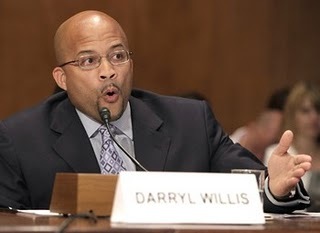[Trigger alert: This post is about racism.]
There is no more incendiary question than the implicit and unspoken question that often follows the promotion of non-white and/or non-male employees:
Did s/he get the job because s/he’s qualified, or did s/he get the job because s/he’s (fill in the diversity criterion here)?
Corporate American is seldom so stupid as to promote a candidate simply & only because s/he has the right diversity characteristics. Women don’t get promoted because they are women, non-whites don’t get promoted because they are not white, and folks with disabilities don’t get promoted so that we can see a person who uses a wheelchair at a stockholders’ meeting. That’s not how it works.
But, and it’s a big ‘but’:
Organizations can and often do benefit when the demographic attributes of their employees add value to the organization’s public image.
Indra Nooyi didn’t get her job as PepsiCo’s CEO because she’s Asian Indian and a female, but it certainly helped Pepsi’s image to have a prominent executive who is female and non-white.
The demographic and physical attributes of an employee often do extra “work” for the organization that employs them, by presenting a certain desirable image that consciously and unconsciously provokes positive responses from their audience.
 BP is currently benefiting from the appointment of a Black employee, Darryl Willis, as the spokesperson for their claims efforts. Willis wasn’t chosen (or volunteered) because he’s Black– he has many other credentials that make him a great candidate for this job. But it is not insignificant that the prominent, identifiable person in BP’s television advertisements is a Black man.
BP is currently benefiting from the appointment of a Black employee, Darryl Willis, as the spokesperson for their claims efforts. Willis wasn’t chosen (or volunteered) because he’s Black– he has many other credentials that make him a great candidate for this job. But it is not insignificant that the prominent, identifiable person in BP’s television advertisements is a Black man.
Using a Black spokesperson, in a rather perverse way, helps BP take advantage of white American racism.
Having a spokesperson like Willis allows BP to take advantage of the Teddy-Bear effect — where the perceived warmth, niceness and personality of a Black man’s appearance disarms white people’s concerns and invites them to be comfortable trusting that person. Using a perceived “teddy bear” as a spokesperson may lead white Americans to trust the organization the “teddy-bear” represents.
But before we consider the Teddy-Bear Effect, check out all the other ways that BP is working to disarm us and get us to trust them, through the television and print ads that feature Darryl Willis.
Comforting, disarming visuals
In the BP Claims television and print ads, Willis’s appearance is crafted so that he appears to be more approachable. He’s wearing khakis and a polo shirt, not a suit and tie. He’s walking one-on-one with a ‘Gulf resident’, not speaking from a podium behind a name card to a large audience.
He is relaxed, direct, unhurried, and earnest.
All of the characteristics presented by Willis are intentionally crafted to make him look as friendly and trustworthy as possible.
Comforting, disarming words
The way Willis audibly delivers BP’s message is disarming. Willis has a warm, low voice and speaks with an identifiable Gulf (Southern LA) accent.
Willis’s words are also carefully crafted to make us want to like him and trust him. He’s the head of “Claims”– getting reparation money to people who’ve been hurt. He’s not an employee who helped to cause the Oil Spill; instead, he’s all about the solution. He describes himself as a ‘volunteer’. He mentions his family and Hurricane Katrina. He describes himself as “from here”.
(I don’t know whether he “volunteered” or not, but the other two description are verifiably true– his mother lost her home to Hurricane Katrina, and he has a personal anchor in the Gulf Coast, having graduated from the University of New Orleans.)
All of these features make us think:
- This spokesperson wasn’t pressured, he really cares.
- This spokesperson has a personal stake in fixing this problem.
- He’s one of ‘us’, one of the people hurt, and so he’ll treat us right.
Dis-arming the Details: What we are NOT shown
Would it surprise you to know that in addition to being the head of “Claims”, Willis is also:
- BP’s Vice President of Resources, BP America
- A scientist, specifically, a geophysicist, who is one of the 50 Most Important African-Americans in Technology
- Worked for BP most of his career, much of it on projects related to deep-water drilling in the Gulf of Mexico?
 None of these details disqualifies him from the job of spokesperson or Head of Claims– but they are details that might make viewers trust him less.
None of these details disqualifies him from the job of spokesperson or Head of Claims– but they are details that might make viewers trust him less.
— A VP? (executive compensation and access to power)
— A Scientist? (cool, rational, all about numbers not about people).
— A BP lifer? (a company man who puts the company and not us first).
So, here we’ve got an important executive, with technical credibility and scientific expertise, handling the payout of insurance claims.
And that’s even before we bring in the issue of race/racism.
TeddyBear vs. Toff
As a thought experiment , compare your impressions of Willis to your impressions of Tony Hayward in a similar kind of television ad. (You can watch this on YouTube.)
The first (Willis) is warm, friendly, approachable, trustworthy, and one of us. The second (Hayward) is cool, distant, elitist, and dismissive. One’s a Teddy-Bear and one is a Toff.
What’s a Toff? “Toff” is slang for a British person of the upper class.
What’s a “TeddyBear”? [ trigger alert] :![]()
A Teddy-Bear is a Black CEO with a “babyface”.
A babyface is characterized by combinations of attributes, including a round face, full cheeks, larger forehead, small nose, large ears and full lips. “Babyfaced adults are treated differently compared with mature-faced adults: baby-faced adults are considered more warm, innocent and trustworthy.”
Now, add race to this picture.
The “Teddy-Bear Effect” describes a racist dynamic where (some) white people (tend) to feel more comfortable with a Black man with a “disarming” appearance.
That is, they tend to feel more comfortable with Black men who, because of the overall gestalt of their facial features, appear to whites to be warmer, more friendly and open.
Black male CEOs with more babyfaced characteristics seem to non-Black observers, to be more competent and less threatening that Black men with more ‘mature” faces.
By extension,
Using a Black male spokesperson whose facial appearance may seem less-threatening to some white people might help the audience feel warmer and more trusting towards BP.
Let me reiterate that Willis is obviously quite qualified in any objective way to speak publicly on behalf of BP. He’s a VP, a geophysicist, and a long-term BP employee. He also has roots in the Gulf community. And, he comes across as warm, friendly, personable and trustworthy.
- Is it cynical to suggest that BP is benefiting from white people’s possible tendency to feel more comfortable with powerful Black men who have Teddy-Bear characteristics?
- Or to suggest that Willis’s appearance is part of an overall effort to craft BP as warmer and more caring?
What do you think?
6/31: Some additional articles on this issue:
- Bruce Ritchie, The FLorida Tribue and Environments.com: BP’s “media star” tries to reassure Florida officials
- Larry D. Woodard, ABC News/Money online: Will this man save BP’s reputation?
References:
- Robert W. Livingston & Nicholas A. Pearce (2009). The Teddy-Bear Effect: Does Having a Baby Face Benefit Black Chief Executive Officers? Psychological Science, vol. 20 no. 10 1229-1236.
- Willis has his masters degree in Geophysics from University of New Orleans, and according to their alumni newsletter was working in the Depwater Gulf of Mexico for BP as early as 2001.
See also:
From AuthenticOrganizations:BP’s Bravest Brandividual: What could be motivating Darryl Willis?
McCain Campaign Exploits the Race of Their Hired Help
From the blog: Stuff White People Do: Prefer babyfaced black men
From Black Voices: BP Chooses a Black Man to Head its Claims Process, by Boyce Watkins, PhD
Image:
Willis Testifies Before Congress, from African-American Environmentalist Association web page
 I am an organizational consultant, change advocate, and organizational identity/reputation scholar with a PhD in leadership & organizations. I research, write about, and consult with organizations on the relationships between organizational identity, actions, and purpose. I teach Technology Management, part-time, at Stevens Institute of Technology.
My current research focuses on how social technologies in the workplace can drive organizational change, generate meaning, and catalyze purpose. See the
I am an organizational consultant, change advocate, and organizational identity/reputation scholar with a PhD in leadership & organizations. I research, write about, and consult with organizations on the relationships between organizational identity, actions, and purpose. I teach Technology Management, part-time, at Stevens Institute of Technology.
My current research focuses on how social technologies in the workplace can drive organizational change, generate meaning, and catalyze purpose. See the 
{ 4 comments }
I would replace “stupid” with “ignorant”. Also, when you say, “All of the characteristics presented by Willis are intentionally crafted to make him look as friendly and trustworthy as possible.”, that’s speculation. It’s likely true, but we don’t know that with certainty. As we have seen, BP is certainly prone to accidents.
Now, to your questions:
Yes. Certainly cynical, but it comes from a powerful skepticism many have toward corporations. As an aside, the movie “The Corporation” belabors the case that corporations exhibit the behaviors of sociopaths. I think this is rubbish. Very sloppy thinking. My car gets turned on every time I turn the key–is that a sign of nymphomania? It’s that sort of portrayal, though, that makes us cynical and jaded toward corporations.
I’m highly skeptical that anyone said that in a meeting. As you know about me, CV, I am an upper-middle-class white heterosexual male who has occupied high-level executive positions in large corporations. More succinctly, I am what many call “The Man”. I also endeavor to be aggressively thoughtful about my position in the social strata and the advantages I enjoy because of how I look. I can tell you from a great many hours in the kind of meetings most people aren’t invited to that there is very rarely this level of strategic thought. To quote Heinlein, “Never attribute to malice that which can be adequately explained by stupidity.”
I suspect there were unconscious instincts about the “Teddy Bear”, but look at the guy’s position. He’s very high up, and he really is from the area, not just a transplant. Not only was he a logical choice by position, but he also might very well have requested the assignment. That happens a lot–executives putting themselves where they want to be.
I get your points, but experience tells me there may not be any sort of conspiracy in play. If I were a conspirator of that level, I would get a black woman in a wheelchair–people would have a harder time beating her up. I have no illusions that we are in a post-racial society, but I think it might be interesting to consider that Willis is simply good at his job and genuine.
Hi Joe,
Thanks so much for your always thoughtful comments… I’m not quite sure that I’d call you a representative of ‘the Man’, but I appreciate it that you can see things from ‘the Man’s’ point of view.
I hope I was clear in the post that I’m not calling into question Willis’ objective qualifications for the spokesperson job, or questioning his own motivation for volunteering for the Claims assignment.
What I am arguing here is not that BP is involved in a self-presentational conspiracy (though they may be) but instead something further down the value pipeline — that BP may be benefiting from implicit racist reactions to Black men who look non-threatening.
I do believe that Willis’s appearance has been carefully crafted by the art directors of the ad agency behind the TV and newspaper spots.
These advertising folks may or may not be interacting with the Corporate Communication/PR people who are helping to screw up other public presentations of BP (unskilled)… and they may or may not be related to the clever people who did the “Beyond Petroleum” campaign (highly skilled). However, there has been a conscious effort to shape how people respond to Willis and these ads, and that effort has included strategies to ‘disarm’ the viewer by making him seem warm and friendly. Advertising is all about that craft, so it is neither cynical nor naive to assume that Willis’s presentation is deliberated shaped to trigger a certain set of responses.
I’m not suggesting that they picked Willis over another less friendly-looking Gulf resident BP employee b/c of the way he looks. But I do think that intentionally and unintentionally BP is benefiting from racism in the audience.
Ah, I see–different direction. I always like to think I am understanding our countrymen, but I am often wrong. I wonder whether some portion of the people in my native South might dismiss any black face. Sad, but all too realistic.
To clarify, I would be very reluctant to characterize BP as strategic enough to a) plan such a thing, and b) keep it a secret long enough to pull it off. To your point, though, there are people whom we are more reluctant to attack than others; if one such person–no matter how qualified–were in a position we might otherwise be inclined to attack, then the company would almost certainly derive benefit from our collective ignorance or trepidation.
Hey CV, finally set aside some time to read and consider your post and am glad that I did. Interesting and thoughtful. I think that you make a lot of really interesting points, many of which I agree with and a few that I am not sure how I feel about yet. One dynamic that I think gives this post a strong foundation is the obvious evidence that BP has a tendency to care more about its public perception than about the reality of what it does and how it does it.
-joe
Comments on this entry are closed.